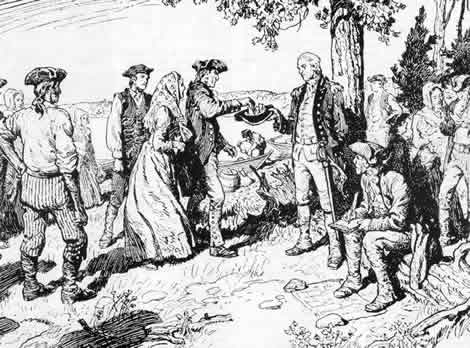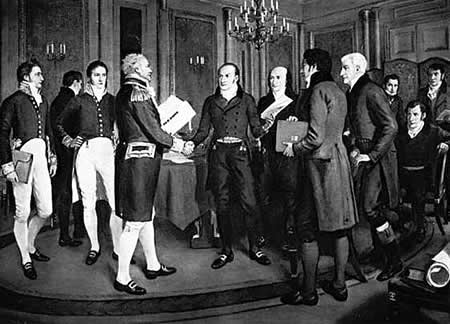 |
| Alexander Hamilton |
In the early on 1790s Alexander Hamilton, thus secretarial assistant of the treasury, was defendant of conspiring to plough the American Republic into a monarchy. The root of that theory tin endure dated, fairly specifically, to Apr 1791 together with a dinner engagement betwixt Hamilton, Thomas Jefferson (then secretarial assistant of state), together with John Adams (then vice-president).
In the class of a conversation on political subjects Adams remarked that the British Constitution “would endure the almost perfect constitution e'er devised past times the wit of man” if solely it were purged of its corruption together with if the House of Commons had equality of representation.
Hamilton responded alongside sentiments derived from i of his favorite political writers, David Hume: “purge it of its corruption, together with laissez passer on to its pop branch equality of representation, together with it would decease an impracticable government: as it stands at present, alongside all its supposed defects, it is the almost perfect regime which e'er existed.”
  |
Jefferson was horrified past times Hamilton’s annunciation together with from that minute purportedly believed that Hamilton was “not solely a monarchist” only that he preferred “a monarchy bottomed on corruption” and, furthermore, Jefferson believed that Hamilton was actively conspiring to erect such a organization inward the United States.
Jefferson together with Madison (who had come upwards to mean value similar him) began to encounter show of Hamilton’s conspiring ways inward many of his writings together with actions, past times together with present. Hamilton’s financial policy inward particular, a policy that aimed to concentrate wealth at the national degree past times assuming debt through a national bank, was characterized as an elaborate ploy designed to deprive the U.S. people of their liberty. As the Republican Party began to coalesce or thus Jefferson together with Madison, Hamilton was portrayed inward the pop press as the caput of a “Royal Faction” intent on ending Republican government.
Rumors spread inward newspapers that Hamilton was plotting to select the Duke of Kent
In May 1791, Jefferson assembled his show of Hamilton’s conspiracy together with presented it to President George Washington, charging that Hamilton’s scheme was to “prepare the agency for a modify from the introduce republican shape of regime to that of a monarchy”.
Washington did non believe a give-and-take of this together with pressed for an halt to the accusations. Learning from Washington of the charges against him, Hamilton defended himself inward a long alphabetic character inward which he argued that the existent conspirators were his accusers.
Hamilton after spoke of the “unkind whispers” leveled against him together with maintained that the “real threat to republicanism came non from Madison together with Jefferson’s imagined grouping of monarchists together with aristocrats, only rather from the disorder together with anarchy that would trial from the devastation or lessening of the influence of the national government.” Hamilton summarized the number inward a fairly accurate agency when he wrote: “One side appears to believe that at that topographic point is a serious plot to overturn the state Governments together with substitute monarchy to the introduce republican system.
The other side firmly believes that at that topographic point is a serious plot to overturn the General Government together with lift the split ability of the states upon its ruins. Both sides may endure every bit incorrect together with their usual jealousies may endure materially causes of the appearances which mutually disturb them, together with sharpen them against each other”.
Washington rightly considered the “wounding suspicions, together with irritating charges” of conspiracy together with counterconspiracy to endure harmful to the harmony of the early on American Republic, only he was unable to select the parties together.
















